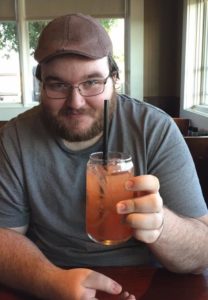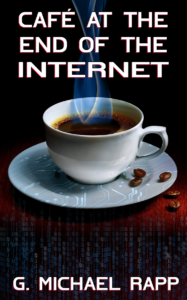 This week we are talking with Clayborn Press author G. Michael Rapp. He was featured in Question of the Day and has an anthology of his own works, Café at the end of the Internet, coming out later this year.
This week we are talking with Clayborn Press author G. Michael Rapp. He was featured in Question of the Day and has an anthology of his own works, Café at the end of the Internet, coming out later this year.
1. How long have you been writing and what is your proudest accomplishment so far?
I know it sounds a bit cliche, but I have been writing since the first or second grade. I have always been interested in stories. Stories have fascinated me, haunted me, and downright followed me wherever I have gone. I grew up listening to stories told by my grandparents and parents–and I’ve been hooked ever since.
The first story I wrote talked about a military coup–I had no idea what that meant, at the time. I think I remember hearing my father talking about some coup or other taking place and I decided to run with it. Before you know it, I had crayons and paper all over the place. On the pages I was drawing pictures of skyscrapers being bombed out by helicopters and cutesy cartoon dialogue bubbles narrating the story for the reader. The story in question got a low grade in school because it was late and because it was deemed too violent–go figure. Anyways, that didn’t discourage me from taking up the crayons again and writing different stories down on bits of paper I got ahold of.
When I was about thirteen or fourteen, my grandfather–on my mother’s side–gave me an old typewriter. It was orangish-red in color and came in a red case. It was the coolest thing I’d ever laid my hands on, and it really opened doors for me when it came to writing. If you hit the fast-forward button a few years, I graduated to a computer, an old laptop my mother had. Like the typewriter and crayons, it really opened doors for me. However, throughout high school, I really didn’t take writing all that seriously. It was something fun–nothing more. When I got to college, the game changed. That’s when I started to think, “Hey, you can start takin’ this writing thing seriously, kiddo.” I didn’t listen to that bit of advice until graduate school. Graduate school really got me thinking about writing as something serious, something to do outside of mere entertainment. I owe a lot of that thinking to a professor named Stefan Kiesbye and a classmate by the name of Alexandra Itzi. The two really helped launch my serious phase of writing–I guess you could say I owe them a lot for their gentle nudgings and advice.
My proudest writing accomplishment has to be my first story being published in El Portal–ENMU’s official literary journal. When I found out that my story was being published, I was thrilled. It was a moment that I had been waiting for for some time. I can still remember the launch party for that particular issue of El Portal that is so near and dear to my heart. We were sitting in the lounge of an old dormitory turned into office space. I spent the better part of an hour worrying over how I was going to read my story. When I finally saw the issue of El Portal sitting there on one of the display shelves, I about lost it. I thought, “This can’t be. They made a mistake. There’s no way my story is good enough for publication.” Fortunately, I was wrong. The piece was worthwhile and it made it into El Portal. That particular piece has since been revised and has been featured in anthology and will be featured in my upcoming short story collection, Cafe at the End of the Internet.
2. What advice would you offer new writers?
Read–a lot. Write–a lot. Rinse and repeat. Just kidding. You need to have a life, too. I would suggest that new writers experiment with their prose. Moreover, I would encourage them to read new things–go outside their chosen genre. If we stick to one genre all the time, we end up creating blatant pastiches of those works we keep reading (over and over again). You also need to have a life. Writing is great–and so is reading. However, having a life will help you reset and find inspiration for stories. Stories are all around us–we just need to look for them.
3. What is something that you struggle with the most when you are writing?
I really struggle with character development. Characters are hard! I find that I have to write and rewrite characters a lot–and I mean a lot. That isn’t necessarily a bad thing. However, it gets annoying when you’ve gone through five or six major character revisions and still haven’t nailed down the character’s essence. I have found that writing characters requires a great deal of writing and rewriting but also a good deal of character study. I try to study characters from my favorite stories. I often revisit the classics–they’re classics in my mind–and I use these as guides to help me develop engaging and worthwhile characters.
4. As a writer, do you have any literary pet peeves when reading books?
I do. I hate it when bad guys are done so poorly. Bad guys don’t think of themselves as bad guys. They believe themselves to be the heroes of their own stories. They don’t laugh like some loonie who has escaped the loonie bin. They don’t smoke cigarettes and down expensive bourbon. Moreover, they don’t always do quote unquote evil things all the time. What makes them evil is far scarier than that. I think of Stephen King. He writes evil characters–and does it well, for the most part. The scariest villains aren’t the monsters or those characters that are downright oozing evilness. They are those ordinary-looking people who do evil things and justify them in the name of good, among other things.
5. When you decided to put your books out for sale, did you go Indie, small press, or with an agent? And what factors contributed to that decision?
For my first book, I decided to go with a small press. I like small presses. Small presses are the working backbone of the publishing industry. Yeah, you have wonderful publishers out there that are bigger fish, but they lack the heart and soul often seen in small presses. Moreover, I feel like I can experiment with my prose, with my ideas, by publishing through a small press.

6. Are you working on anything new?
I am. I am currently working on a short story collection titled Cafe at the End of the Internet. Cafe is a collection of my failed beginnings. In other words, most of the stories were the beginnings of novellas, novels, grand epics, and the like but never made it to the finish line, so to speak. Instead, these stories have been turned into short stories, sketches, novelettes, and novellas.
7. Would you describe yourself more as a “pantser” or an “architect” type of writer? (someone who makes it up as they go along, or someone who plans meticulously)
It depends on the writing situation. If I am writing something that requires a bit of work beforehand, I guess you could say that I am an architect. For example, I spent about three or four months coming up with a story called “Rat Box.” “Rat Box” required a good bit a planning, as the world-building had to be just right. Moreover, the characters and dialogue had to match up with the vibe I was working with in the story I had envisioned. In other situations, I guess you could say that I am pantser. For a recent story, “Neom City Blues,” I spent a good deal of time just writing it as the story came to me. I really didn’t plan anything–except maybe the title. Even the dialogue just flowed from my brain to my fingers. It was pretty fantastic.
8. What is your writing process like?
My writing process is a mess, to be honest. Sometimes I begin with a few handwritten notes and then begin writing off the cuff, so to speak. Other times, I spend a good deal of time world-building in my head, taking notes, and writing and rewriting small portions of prose until I get them right. When I get into the writing stage, I rarely go back to my notes. I try to get what comes to me and put it on paper. After I’m finished with the initial draft, I then go and edit the text, using my notes as a guide. Sometimes I change what I have in my notes to match up with what I have written–and, other times, the opposite happens.
One annoying thing I have integrated into my writing process is a rather unusual method of rewriting. Specifically, rewriting for major changes. I have trouble doing major revisions on screen and paper, so I start from scratch each time, rewriting the text from the original, adding and subtracting along the way. It makes writing more of a chore, but I end up changing the text in question for the better. I have found that this method of rewriting forces me to see the piece as something new each time, rather than an old dreary text that I’m stuck with.
9. Do you use any special tools or programs to help you write?
I’ve used a dozen different programs and tools to help me write. However, I have found that the simplest tools and programs are usually the best: pen, paper, and MS Word or Google Docs.
10. Is there anything else that you’d like to share with reader or aspiring writers?
I would like to say to aspiring writers that readers are your best friend when you need help finding issues in a text–with some exceptions. Great readers will sniff out plot holes, bad characters, terrible dialogue, and the like from a mile away. However, I would also tell aspiring writers to be careful of what readers say about your text. Some readers just won’t like what you have produced. Others will love ya no matter what–I’m talking about you, mom. Then there are readers who are honest-to-god blessings in disguise. They will tell you what you did right and what needs work. Take this criticism seriously–to hell with the rest.![]()
